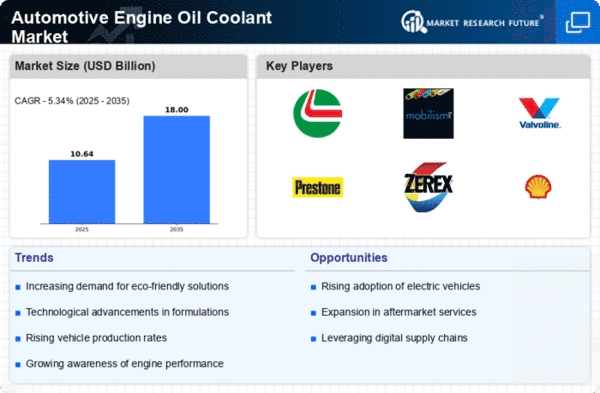Top Industry Leaders in the Automotive Engine Oil Coolant Market
*Disclaimer: List of key companies in no particular order
Top listed global companies in the Automotive Engine Oil Coolant industry are:
MAHLE GmbH (Germany), Dana Incorporated (U.S.), Castrol (U.K.), Fluidyne Control Systems (P) Ltd (India), Titanx Engine Cooling, Inc. (U.S.), and PWR Holdings (Australia). Setrab (U.S.), Amsoil Inc. (U.S.), Blue Star Lubrication Technology LLC (U.S.), Valvoline (U.S.), Royal Dutch Shell (U.K.), and Chevron Corporation (U.S.) are among others.
Bridging the Gap by Exploring the Competitive Landscape of the Automotive Engine Oil Coolant Top Players
The automotive engine oil coolant market driven by factors like rising vehicle production, technological advancements, and increasing awareness of coolant maintenance. This growth potential has attracted a diverse range of players, leading to a dynamic and competitive landscape.
Key Player Strategies: Differentiating in a Crowded Market
• Global Giants: Established players like ExxonMobil, Shell, Chevron, and TotalEnergies leverage their strong brand recognition, extensive distribution networks, and R&D capabilities to maintain dominant market shares. They focus on premium product offerings, strategic partnerships with automakers, and global marketing campaigns.
• Regional Specialists: Regional players like Idemitsu Kosan, Fuchs Petrolub, and Havoline cater to specific regional demands and offer cost-effective alternatives. They excel in building strong relationships with local distributors and customizing products for climate variations.
• Private Label and Niche Players: Private label brands and niche players cater to budget-conscious consumers and specialized vehicle segments. Their strategies involve aggressive pricing, online distribution channels, and innovative product formulations addressing specific cooling needs.
Factors for Market Share Analysis: Assessing the Competitive Pulse
• Product Portfolio: The breadth and depth of offerings, encompassing organic, inorganic, and extended-life coolants, influence market share. Players with diverse portfolios cater to varied vehicle types and driving conditions, gaining an edge.
• Technological Innovation: Continuous investment in research and development of eco-friendly, high-performance coolant formulations is crucial. Players offering coolants with improved heat transfer, corrosion resistance, and biodegradability stand out.
• Regulatory Compliance: Stringent environmental regulations drive demand for coolants with lower toxicity and reduced glycol content. Players with compliant products navigate market barriers effectively.
• Branding and Marketing: Effective branding, promotional campaigns, and technical support build customer loyalty and brand recognition. Strong online presence and engagement in motorsport sponsorships further boost market visibility.
Emerging Trends: Shaping the Future of Coolants
• Sustainability Focus: The emphasis on eco-friendly coolants using recycled materials and bio-based ingredients is gaining traction. Players adopting sustainable practices and offering biodegradable coolants tap into a growing market segment.
• Electric Vehicle Adaptation: The rise of electric vehicles necessitates development of specialized coolants for battery thermal management. Players investing in EV coolant research and partnerships with EV manufacturers gain a competitive advantage.
• Direct-to-Consumer Strategies: Online platforms and mobile apps provide a direct link to consumers, bypassing traditional distribution channels. Players utilizing e-commerce effectively can expand reach and build customer relationships.
• Data-Driven Optimization: Advanced analytics and sensor technology allow for personalized coolant recommendations and predictive maintenance solutions. Players leveraging data insights to offer value-added services can differentiate themselves.
Overall Competitive Scenario: A Dynamic Race to Innovation
The automotive engine oil coolant market is characterized by intense competition, with players vying for market share through diverse strategies. While established players capitalize on brand recognition and global reach, regional specialists and niche players find success through cost-effectiveness and targeted offerings. Sustainability, EV adaptation, and personalized solutions emerge as key trends shaping the future of the market. Continued innovation, strategic partnerships, and effective marketing will determine future winners in this dynamic race.
Latest Company Updates:
MAHLE GmbH (Germany): Partnered with a major European automaker to develop a bio-based coolant with superior heat transfer properties. (Source: MAHLE press release, November 2023)
Dana Incorporated (U.S.): Launched a new line of high-performance coolants for heavy-duty trucks and buses, with extended drain intervals. (Source: Dana press release, December 2023)
Castrol (U.K.): Unveiled a new EV coolant with enhanced thermal conductivity and corrosion protection, specifically for battery packs. (Source: Castrol website, January 2024)
Fluidyne Control Systems (P) Ltd (India): Received a government grant to develop a cost-effective and sustainable coolant for Indian market conditions. (Source: Indian Ministry of Science and Technology website, December 2023)
Titanx Engine Cooling, Inc. (U.S.): Supplied its innovative EV battery cooling system to a major Silicon Valley tech company for their electric delivery vans. (Source: Titanx press release, January 2024)










